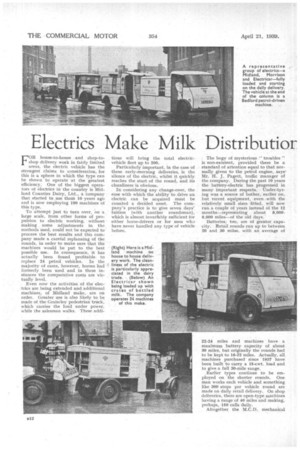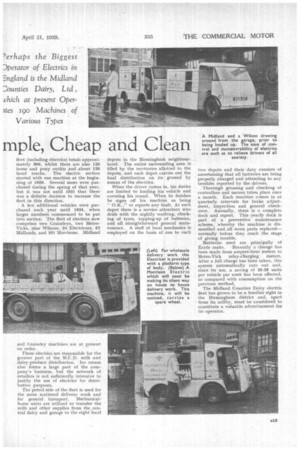Electrics Make Milk Distributior mple, Cheap and Clean
Page 48

Page 49

If you've noticed an error in this article please click here to report it so we can fix it.
FOR house-to-house . and shop-toshop delivery work in fairly limited areas, the electric vehicle has the strongest claims to consideration, for this is a sphere in which the type can be shown to operate at the greatest efficiency. One of the biggest operators of electrics in the country is Midland Counties Dairy, Ltd., a Company that started to use them 10 years ago and is now employing 190 machines of this type.
To attempt just to turn over, on a large scale, from other forms of propulsion to electric working, without making . some adjustments in the methods used, could not be expected to procure the best results and this company made a careful replanning of the rounds, in order to make sure that the machines would be put to the best possible use. In consequence, it has actually been found profitable. to replace 24 petrol vehicles. In the majority of cases, however, horses had formerly been used and in these instances the comparative costs are virtually level.
Even now the activities of •the eketrics are being extended and additional machines, of Midland make, are on order. Greater use is also likely to be made of the Graiseley pedestrian thick, which carries the load under power, while the salesman walks. These addi
tions will bring the total electricvehicle fleet up to 200.
Particularly important, in the case of these early-morning deliveries, is the silence of the electric, whilst it quickly reaches the start of the round, and its cleanliness is obvious.
Id considering any change-over, the ease with which the ability to drive an electric can be acquired must be counted a decided asset, The company's practice is to give seven .days' tuition (with another roundsrnan), which is almost invartably sufficient for
• either horse-drivers or for men who have never handled any type of vehicle before.
The bogy of mysterious " troubles is non-existent, provided there be a standard of attention equal to that normally .given to the petrol engine, says' Mr. H. J. Pagett, traffic manager of the company. During the past 10 years the battery-electric has progressed in many important respects. Under-tyring was a source of bother, earlier on, but recent equipment, even with the relatively small sizes fitted, will now run a couple of years instead of the 12 months----representing about 8,0009,000 miles—of the old days.
Batteries, too, are of greater capacity. Retail rounds run up to between 20 and 30 mile's, with art average of 22-24 miles and machines have a maximum battery capacity of about 30 miles, but originally the rounds had to be kept to 16-22 miles. Actually, all machines purchased since 1937 have been built to carry a 15-cwt. load and to give a full 30-mile range.
Earlier types continue to be employed on the shorter rounds. One man works each vehicle and something like 300 stops per vehicle round are made on daily retail delivery. On shop deliveries, there are open-type machines having a range of 40 miles and making, perhaps, 150 calls daily.
Altogether. the M.C.D. mechanical
fleet (including electrics) totals approximately 300, whilst there are also 120 horse and pony outfits and about 120 hand trucks. The electric section started with one machine at the beginning of 1929. Several more were purchased during the spring of that year, but it was not until 1931 that there was a definite decision to increase the fleet in this direction.
A few additional vehicles were purchased each year until 1934, when larger numbers commenced to be put into service. The fleet of electrics now comprises two Graiseleys, two MetroVicks, nine Wilsons, 24 Electricars, 52 Midlands, and 101 Morrisons. Midland
and Graiseley machines are at present on order.
These electrics are responsible for the greater part of the M..C.D. milk and dairy-produce distribution, Ice cream also forms a large part of the company's business, but the network of retailers is not sufficiently intensive to justify the use of electrics for distributive purposes.
The petrol side of the fleet is used for the more scattered delivery work and for general transport. Mechanicalhorse units are utilized to transfer the milk and other supplies from the central dairy and garage to the eight local
depots in the Birmingham neighbourhood. The entire surrounding area is filled by the territories allotted to the depots, and each depot carries out the final distribution on its ground by means of the electrics.
When the driver comes in, his duties are limited to loading his vehicle and covering his 'round. When he finishes he signs off his machine as being" 0. K.," or reports any fault. At each depot there is a service attendant who deals with the nightly washing, checking of tyres, topping-up of batteries, and all straightforward general maintenance. A staff of local mechanics is employed on the basis of one to each two depots and their duty consists of ascertaining that all batteries are being properly charged and attending to any troubles reported by the drivers.
Thorough greasing and checking of controllers and meters takes place once a month. Each machine comes in at quarterly intervals for brake .adjustment, inspection and general checkover. Annually, there is a, complete dock and report. This yearly dock is part of a preventive maintenance scheme, whereby the machine is dismantled and all worn parts replaced— normally before they reach the stage of giving trouble.
Batteries used are principally of Exide make. -Recently a change has been made from ampere-hour meters to Metro-Vick relay-charging meters. After a full charge has been taken, this system automatically cuts out and, since its use, a saving of 25-28 units per vehicle per week has been effected, as compared with consumption on the previous method.
The Midland Counties Dairy electric fleet has grown to be a familiar sight in the Birmingham district and, apart from its utility, must be considered to constitute a valuable advertisement for its operator.






































































































































